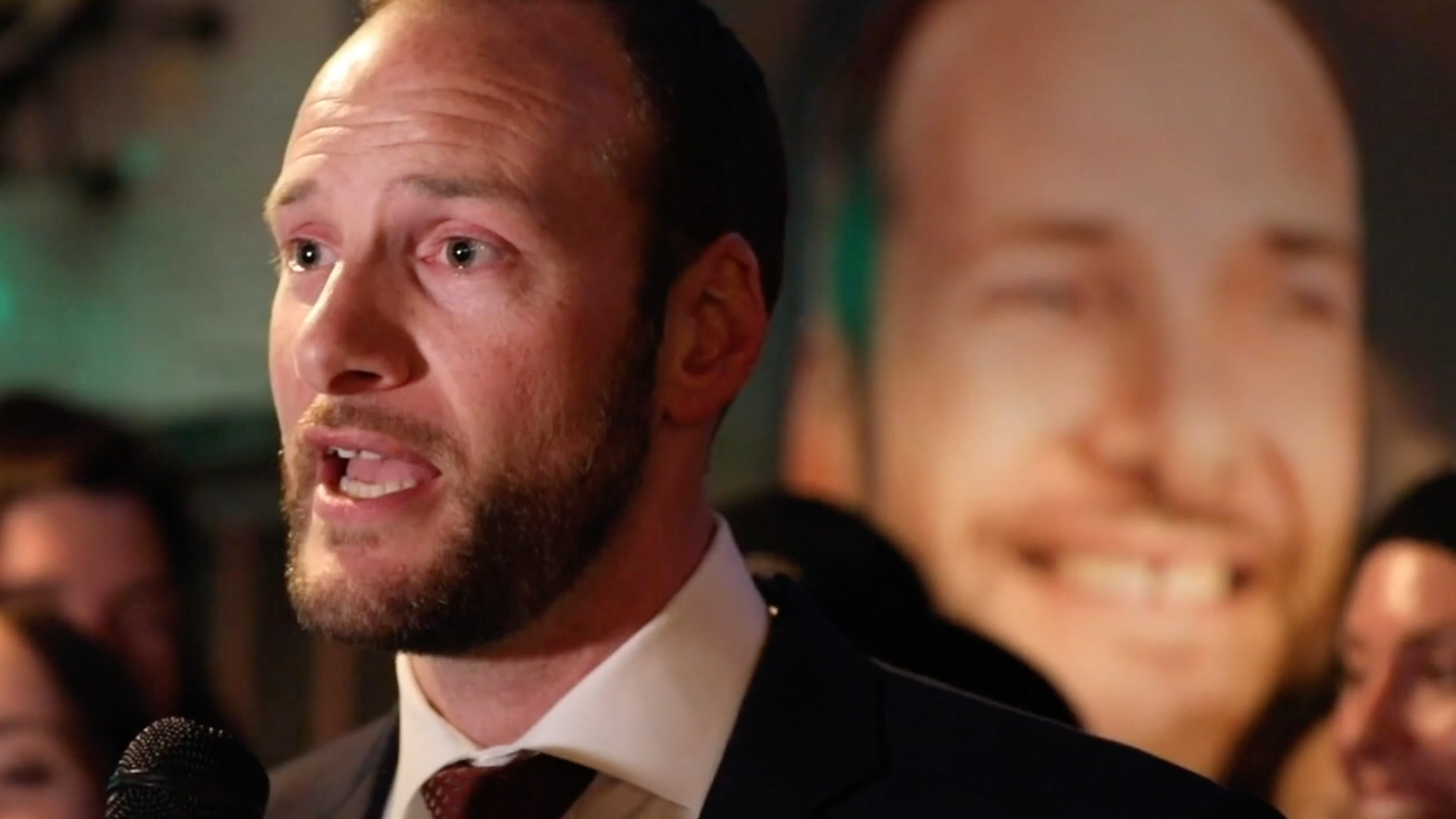What a San Francisco vote says about the US left
- Published
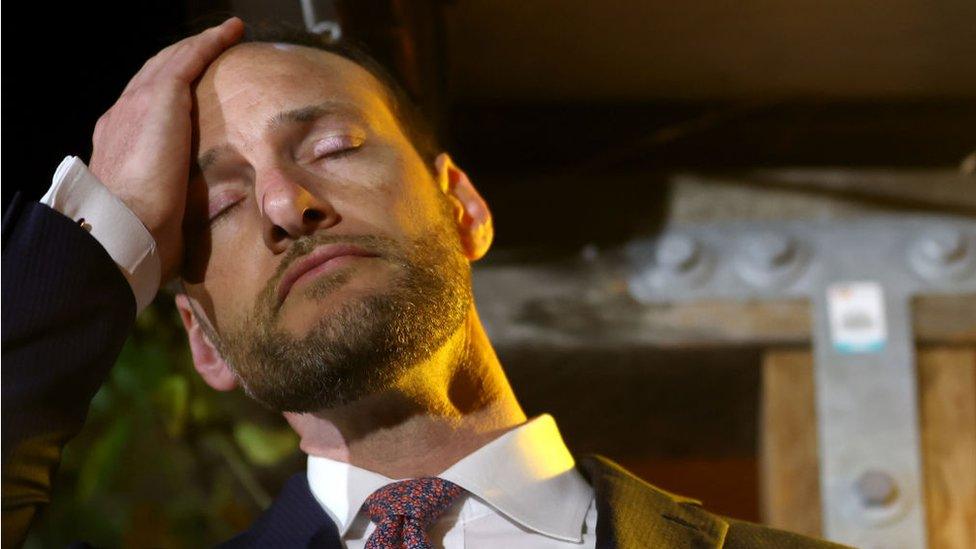
San Francisco's district attorney Chesa Boudin was defeated in a recall election on Tuesday
Parts of San Francisco have been in a state of emergency this year. The city's drugs and homelessness crisis has divided Democrats - and this week helped bring about the political demise of one of its most prominent politicians.
Like thousands of people in San Francisco, Jay has been sleeping rough on the streets.
Jay describes his life as nightmarish - as he struggles with a fentanyl addiction he derives no pleasure from. He says he shoots up just to feel normal.
"It's horrible man. I'm sick all the time," he says.
The streets where he lives - the city's notorious Tenderloin district - are dangerous too. He says he's had fights. Drug dealers have burnt his tent down several times.
"This is anarchy," he says. "It's lawless, utterly lawless."
In the past two years 1,300 people have died of a drugs overdose in the city - many found dead in a tiny area in the centre - perhaps 10 blocks by 12 blocks - incorporating the Tenderloin and another district, SoMa.
Last year, the city reached a grim milestone - official statistics found that more people had died from drugs overdoses than from Covid. Fentanyl, a drug 100 times stronger than morphine, has flooded San Francisco's drug scene. It's by far the most lethal drug in the city.
The crisis spurred a rift between San Francisco's two most prominent elected Democrats - and exposed a divide over how the left wants to tackle drugs, homelessness and crime.
This week the fallout claimed its first victim, with San Francisco's district attorney, Chesa Boudin, voted out of office.
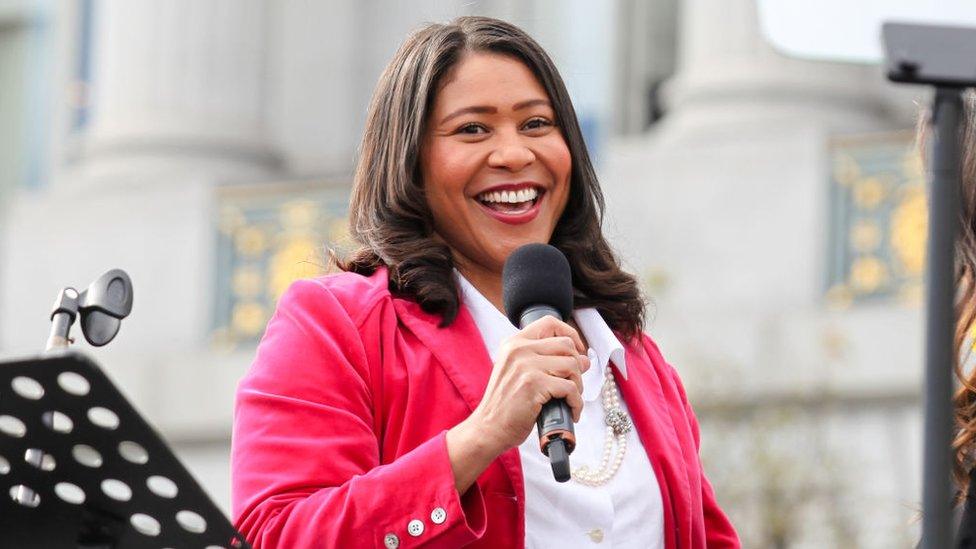
San Francisco Mayor London Breed
On one side of the debate is London Breed, San Francisco's Democratic mayor, for whom the Tenderloin is deeply personal. She recalls vividly how her 25-year-old sister was found dead in the district from a drug overdose in 2006.
Ms Breed grew up in San Francisco's projects (subsidised housing areas). Speaking to the BBC from her plush offices in city hall, she declared that she was "from the hood".
Voted into office in 2018 on a platform focusing on homelessness, she burnished her progressive bona fides after the 2020 murder of George Floyd by supporting so-called "defund the police" policies, diverting $120m from the departmental budget to services and programmes for black communities in the city.
But that was then, and what has happened in the Tenderloin since has made her question the positions she once believed in.
In December last year, Ms Breed announced, in colourful language, a spectacular U-turn on the city's approach to drugs, homelessness and crime.
She said she was tired of the "bullshit that has destroyed our city".
At her press conference last year, she made clear that the new direction for the city would be one of "tough love" - more police and a more aggressive approach to crime.
San Francisco has long had liberal drugs laws, support services and needle exchanges - where users can get clean drug paraphernalia. This approach can work in reducing drug deaths. But critics argue that these progressive policies alone don't do enough to push people away from addiction.
Then fentanyl came along. Local police say the drug has slowly replaced crack cocaine and heroin. Its potency makes it easy to get the dosage wrong and overdose.
The proliferation of fentanyl has contributed to a huge rise in drug deaths.
In 2017, 222 people died in San Francisco of drug overdoses. In 2020, it was 711.
And that stark increase focussed minds in City Hall.
"We're compassionate," she said. "But at the same time, we're not going to tolerate certain things that have gone on for far too long."
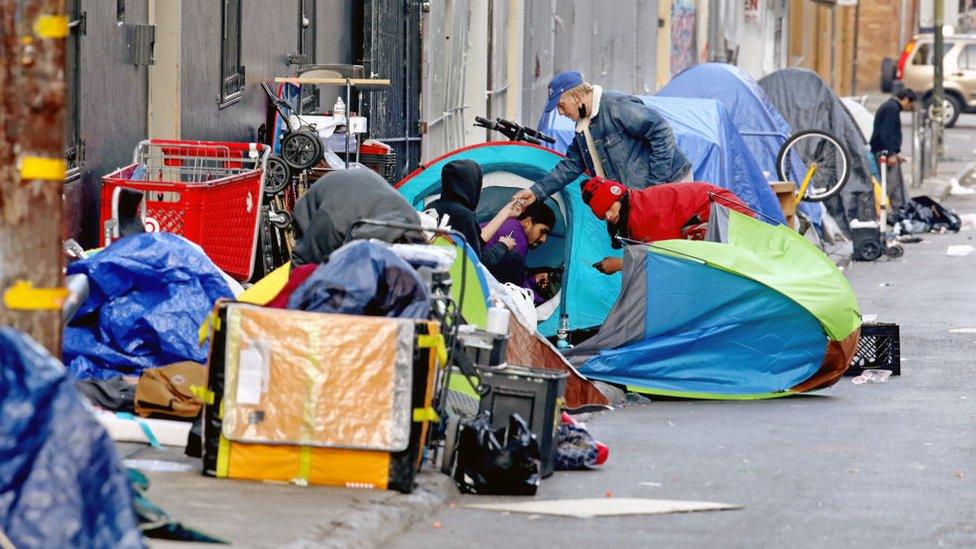
Homeless people are often seen consuming drugs in San Francisco's Tenderloin district
However, her more aggressive approach to San Francisco's problems isn't supported by everyone - including some in her own political tribe.
In 2020, Chesa Boudin became one among a wave of progressive district attorneys elected in cities across America.
As the city's top prosecutor, the district attorney determines which crimes get prosecuted - and Mr Boudin was unconvinced that "tough love" was the right approach.
"We need real investments in housing, on treatment on demand, on mental health services on harm reduction," he told the BBC. "Doubling down on a failed war on drugs is never going to solve those problems."
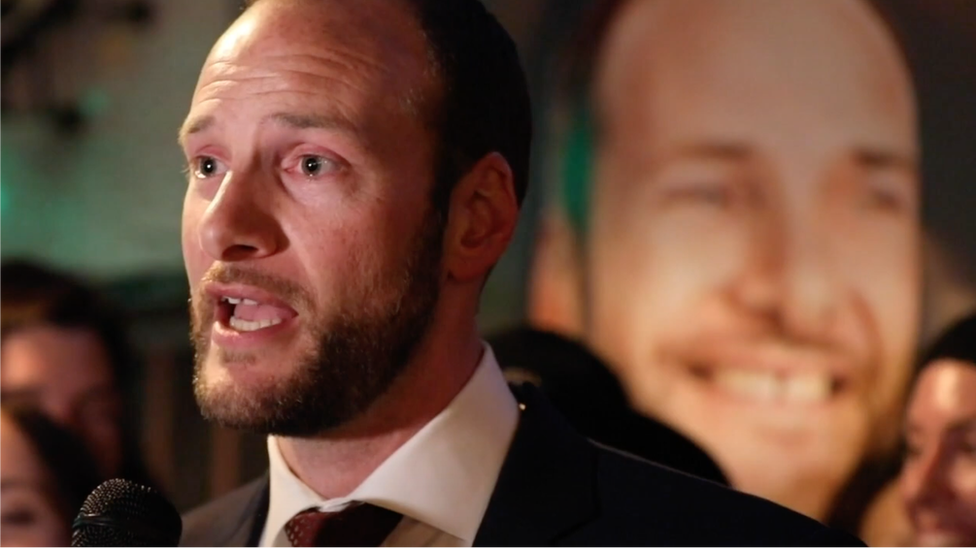
San Francisco District Attorney, Chesa Boudin
He argued that more services were needed, more resources, to tackle the problem.
Ms Breed disputed that claim, arguing that investments alone "are not going to combat the challenges that continue to exist in the city".
The very public falling out between Mr Boudin and Ms Breed has been emblematic of a wider argument that is going on within the Democratic party over law and order.
The Democrats run many large cities across America. However, with murder rates and drug deaths spiking, cities and the progressives governing them have faced intense pressure to change tack.
In San Francisco, Mr Boudin failed to convince voters his progressive approach was working - losing a recall vote on Tuesday. Many San Franciscans had become exasperated with how a wealthy town had somehow managed to have gained a reputation as a failed city.
But its problems are far more complex than the policies enacted by Mr Boudin in his 30-month tenure as district attorney. Drug related deaths have risen across the US amid the Covid pandemic, and there is scant evidence that the ousted prosecutor's positions drove up violent crime.
The two politicians' disagreement has had an impact on the ground though. Local police say they are unsure of what kind of crime they should make arrests on. Is San Francisco a city that practices tough love or leniency? And people sleeping rough say the approach to them can vary from day to day. Sometimes they're moved on, or even arrested. But mostly they're ignored.
Jay says the police mainly leave him alone. "Unless you're committing extreme violence, the police don't care".
He says he doesn't worry about injecting fentanyl - he knows what he's doing.
Many people in the Tenderloin say something similar, even though they admit to knowing dozens who have died of a drug overdose in the past two years.
With Mr Boudin out of office Ms Breed now has the freedom to implement her law and order vision in the city. From the result of the recall vote, it would appear that is what seemingly liberal San Franciscans want.
You can watch James Clayton's Our World documentary Fixing San Francisco on BBC iPlayer here and on YouTube here, external
Watch: The former prisoners tasked with patrolling San Francisco
Related topics
- Published8 October 2018
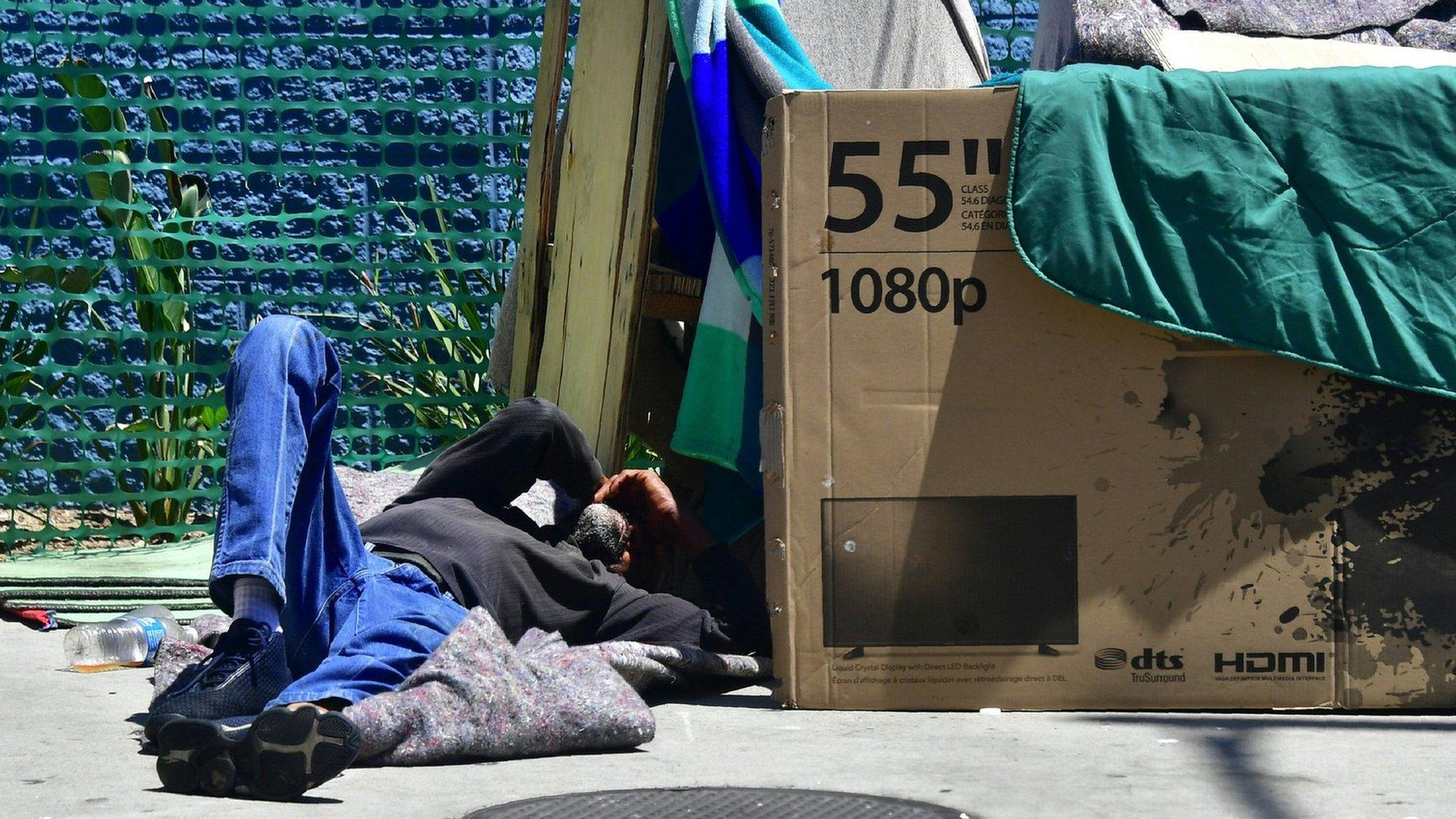
- Published27 April 2016
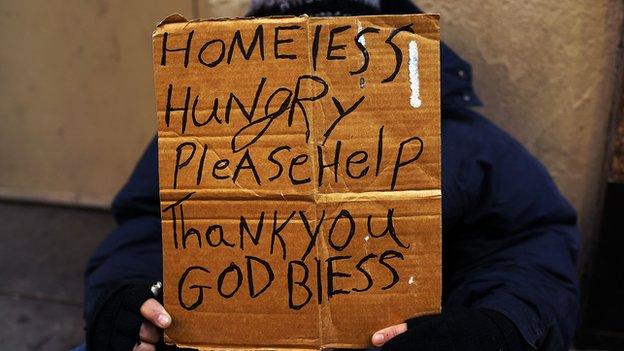
- Published30 December 2020
